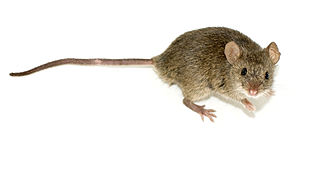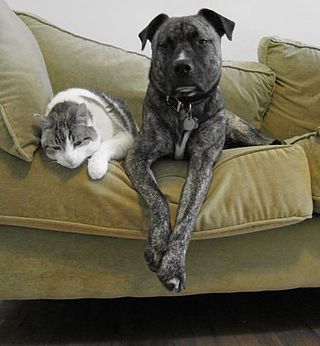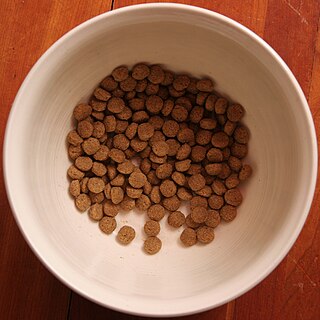
A mouse is a small rodent. Characteristically, mice are known to have a pointed snout, small rounded ears, a body-length scaly tail, and a high breeding rate. The best known mouse species is the common house mouse. Mice are also popular as pets. In some places, certain kinds of field mice are locally common. They are known to invade homes for food and shelter.

A pet, or companion animal, is an animal kept primarily for a person's company or entertainment rather than as a working animal, livestock, or a laboratory animal. Popular pets are often considered to have attractive/cute appearances, intelligence, and relatable personalities, but some pets may be taken in on an altruistic basis and accepted by the owner regardless of these characteristics.

Dog food is food specifically formulated and intended for consumption by dogs and other related canines. Dogs are considered to be omnivores with a carnivorous bias. They have the sharp, pointed teeth and shorter gastrointestinal tracts of carnivores, better suited for the consumption of meat than of vegetable substances, yet also have ten genes that are responsible for starch and glucose digestion, as well as the ability to produce amylase, an enzyme that functions to break down carbohydrates into simple sugars – something that obligate carnivores like cats lack. Dogs evolved the ability living alongside humans in agricultural societies, as they managed on scrap leftovers and excrement from humans.
Mars, Incorporated is an American multinational manufacturer of confectionery, pet food, and other food products and a provider of animal care services, with US$45 billion in annual sales in 2022. The company was ranked as the fourth-largest privately held company in the United States by Forbes. Headquartered in McLean, Virginia, the company is entirely owned by the Mars family. Mars operates in four business segments around the world: Mars Wrigley Confectionery, Petcare, Food, and MARS Edge, the company's life sciences division.

Iams is an American brand of dog food and cat food manufactured by Spectrum Brands in Europe and Mars, Incorporated worldwide. The food is formulated for the puppy/kitten, adult and mature stages of life. Veterinary formulas for pets with special dietary requirements are also produced.

Nestlé Purina PetCare, or simply Purina, is an American subsidiary of the Swiss corporation Nestlé, based in St. Louis, Missouri. It produces and markets pet food, treats, and cat and dog litter. Some of its pet food brands include Purina Pro Plan, Purina Dog Chow, Friskies, Beneful and Purina One. The company was formed in 2001 by combining Nestlé's Friskies PetCare Company with Ralston Purina, which acquired it for $10.3 billion. As of 2012, it is the second-largest pet food company globally and the largest in the United States.

Cat food is food specifically designed for consumption by cats. As obligate carnivores, cats have specific requirements for their dietary nutrients, namely nutrients found only in meat, such as taurine, arginine, and Vitamin B6. Certain nutrients, including many vitamins and amino acids, are degraded by the temperatures, pressures and chemical treatments used during manufacture, and hence must be added after manufacture to avoid nutritional deficiency.
Raw feeding is the practice of feeding domestic dogs, cats, and other animals a diet consisting primarily of uncooked meat, edible bones, and organs. The ingredients used to formulate raw diets vary. Some pet owners choose to make home-made raw diets to feed their animals but commercial raw diets are also available.

Anthrozoology, also known as human–nonhuman-animal studies (HAS), is the subset of ethnobiology that deals with interactions between humans and other animals. It is an interdisciplinary field that overlaps with other disciplines including anthropology, ethnology, medicine, psychology, social work, veterinary medicine, and zoology. A major focus of anthrozoologic research is the quantifying of the positive effects of human–animal relationships on either party and the study of their interactions. It includes scholars from fields such as anthropology, sociology, biology, history and philosophy.

Pet food is animal feed intended for consumption by pets. Typically sold in pet stores and supermarkets, it is usually specific to the type of animal, such as dog food or cat food. Most meat used for animals is a byproduct of the human food industry, and is not regarded as "human grade".

Royal Canin is a French manufacturer and global supplier of cat and dog food. The company is a subsidiary of Mars, Incorporated. It undertakes research into the specific nutritional needs of dogs and cats.

Cat genetics describes the study of inheritance as it occurs in domestic cats. In feline husbandry it can predict established traits (phenotypes) of the offspring of particular crosses. In medical genetics, cat models are occasionally used to discover the function of homologous human disease genes.

The health of domestic cats is a well studied area in veterinary medicine.

Obesity in pets occurs when excessive adipose tissue accumulates in the body, and is generally defined as occurring when an animal's body weight is at least 20% greater than its optimal body weight. Obesity is associated with metabolic and hormonal changes, and can predispose pets to illnesses like orthopedic disease, diabetes, and cancer.
AniCura AB is a European family of animal hospitals and clinics focused on primary and specialized veterinary care for companion animals. AniCura AB has operations in Sweden, Norway, Denmark, Germany, Austria, Switzerland, the Netherlands, Spain, Italy, France, Belgium, Portugal, Andorra and Russia. The company comprise 450 animal hospitals and clinics that are visited by 3.6 million pets every year, mainly cats and dogs. The total number of employees is approximately 11,000 of whom 4,000 are veterinarians and half have some form of specialist qualification, either national or international specialisation.
Between 5% and 10% of homeless peoplein the United States own pets. Studies of homeless pet owners in urban settings show a sense of identity and community connection between pets and their owners. This topic is part of the Animals and Society branch of study in the field of Sociology, and is also an issue with the values and responsibility of pet ownership.
Whistle Labs Inc. is a subsidiary of Mars Petcare headquartered in San Francisco, California. It produces and markets the Whistle GPS Pet Tracker, a device worn on a pet's collar that monitors its activity and location. In addition to pet owners, the devices have been used by veterinary researchers.

As in the human practice of veganism, vegan dog foods are those formulated with the exclusion of ingredients that contain or were processed with any part of an animal, or any animal byproduct. Vegan dog food may incorporate the use of fruits, vegetables, cereals, legumes including soya, nuts, vegetable oils, as well as any other non-animal based foods.

Pet humanization is a form of anthropomorphism in which pets, typically animals kept for companionship such as dogs, cats and even smaller animals like rabbits or hamsters, are treated more like human family members than traditional pets. This trend of pet culture involves providing pets with a higher level of care, attention and often even luxury, similar to the way humans are treated.














